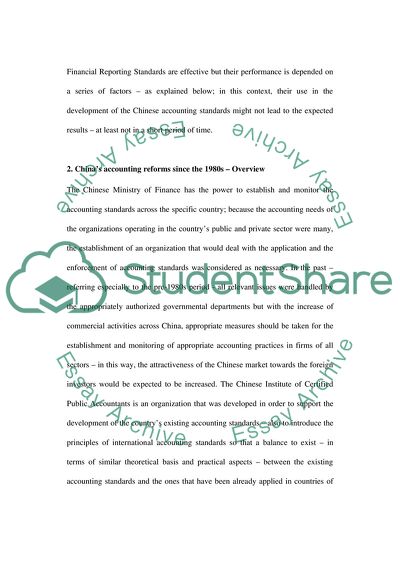Cite this document
(The Global Commercial Market and the Firms Accounting System in China Research Paper, n.d.)
The Global Commercial Market and the Firms Accounting System in China Research Paper. Retrieved from https://studentshare.org/finance-accounting/1737590-chinas-increased-role-in-the-world-economy-has-stimulated-reforms-of-chinas-accounting-standards-to-make-them-increasingly-similar-to-ifrs-standards-but-it-is-not-likely-that-in-practice-accounting-in-china-will-quickly-become-identical-to-all-other
The Global Commercial Market and the Firms Accounting System in China Research Paper. Retrieved from https://studentshare.org/finance-accounting/1737590-chinas-increased-role-in-the-world-economy-has-stimulated-reforms-of-chinas-accounting-standards-to-make-them-increasingly-similar-to-ifrs-standards-but-it-is-not-likely-that-in-practice-accounting-in-china-will-quickly-become-identical-to-all-other
(The Global Commercial Market and the Firms Accounting System in China Research Paper)
The Global Commercial Market and the Firms Accounting System in China Research Paper. https://studentshare.org/finance-accounting/1737590-chinas-increased-role-in-the-world-economy-has-stimulated-reforms-of-chinas-accounting-standards-to-make-them-increasingly-similar-to-ifrs-standards-but-it-is-not-likely-that-in-practice-accounting-in-china-will-quickly-become-identical-to-all-other.
The Global Commercial Market and the Firms Accounting System in China Research Paper. https://studentshare.org/finance-accounting/1737590-chinas-increased-role-in-the-world-economy-has-stimulated-reforms-of-chinas-accounting-standards-to-make-them-increasingly-similar-to-ifrs-standards-but-it-is-not-likely-that-in-practice-accounting-in-china-will-quickly-become-identical-to-all-other.
“The Global Commercial Market and the Firms Accounting System in China Research Paper”, n.d. https://studentshare.org/finance-accounting/1737590-chinas-increased-role-in-the-world-economy-has-stimulated-reforms-of-chinas-accounting-standards-to-make-them-increasingly-similar-to-ifrs-standards-but-it-is-not-likely-that-in-practice-accounting-in-china-will-quickly-become-identical-to-all-other.


